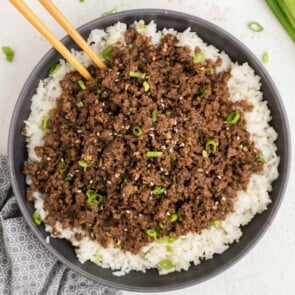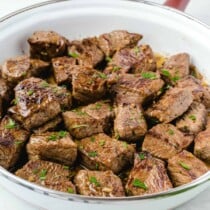Korean BBQ Pork recipe (aka jeyuk bokkeum) is packed with sweet, and savory flavors. Pieces of pork are marinated in a spicy Gochujang Korean chili paste mixture and pan-fried to perfection!
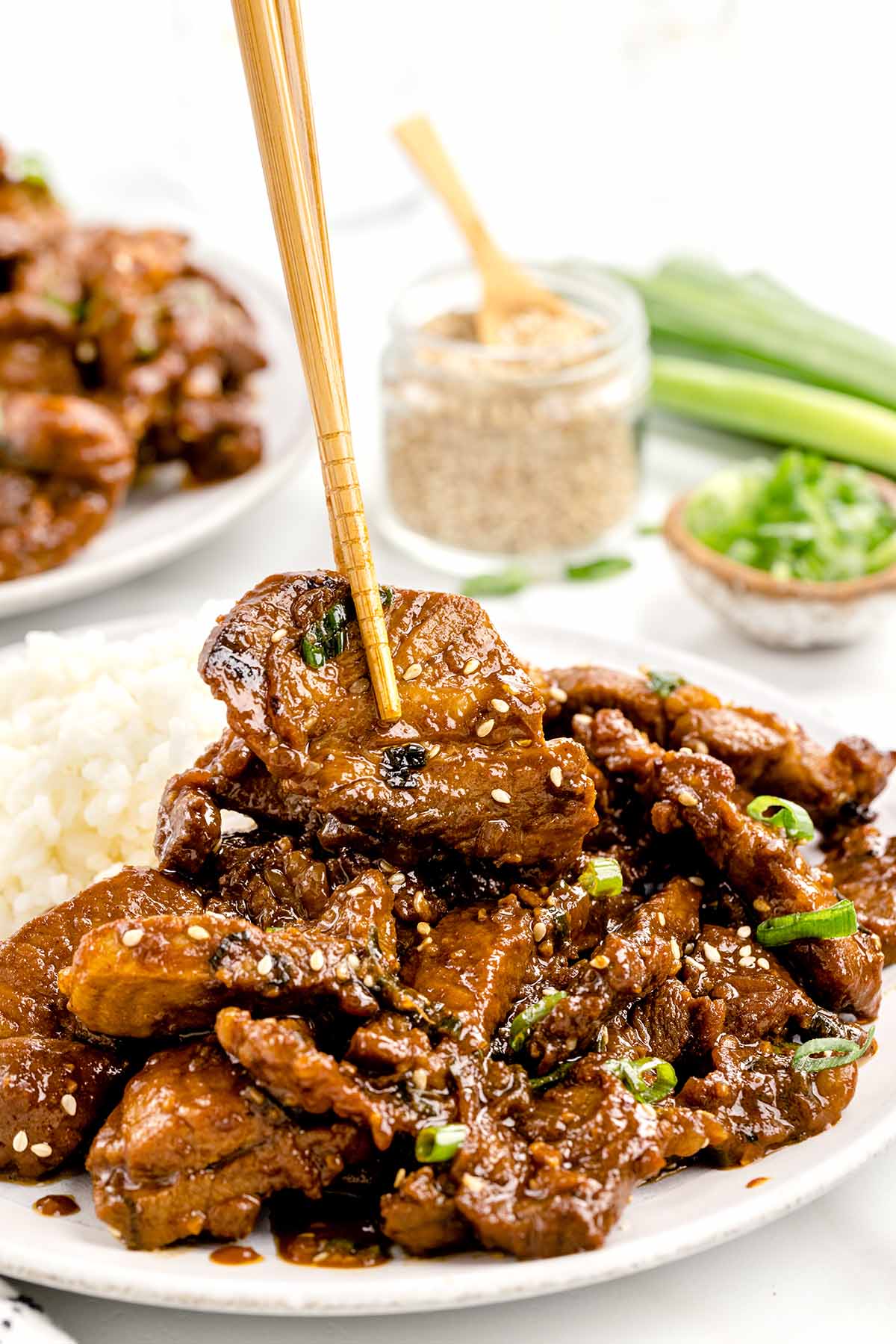
Spicy Korean Pork Bulgogi
Our spicy Korean BBQ Pork bulgogi is easy to make at home using pork that’s been marinated in a garlic, ginger, gochujang based mixture, then quickly stir-fried, garnished with scallions and sesame seeds, and served with a side of rice.
The spicy Korean pork sauce is the perfect blend of spicy and savory with a hint of sweetness from brown sugar and grated apple, but my favorite flavor profile comes from the gochujang red chili paste because it’s filled with a bold, complex taste in just one ingredient.
Although the classic Korean spicy marinated pork recipe is traditionally made with butterflied bbq pork ribs, they’re harder to find and take more time to prepare; that’s why I make my Korean style pork using boneless pork butt, and also because the spicy marinade works best with these fatty portions.
Why We Love Korean Barbecue Pork Recipes
- Easy to make at home.
- Uses a handful of simple ingredients.
- Pork can be grilled over open fire, or pan-fried, or prepared on a Korean BBQ plate.
- Korean pork bbq marinade is bursting with savory, spicy, sweet heat that bathes the pieces of pork.
- Better than Korean BBQ take out, and easier to make than its Korean fried chicken counterpart.
Korean BBQ Pork Ingredients
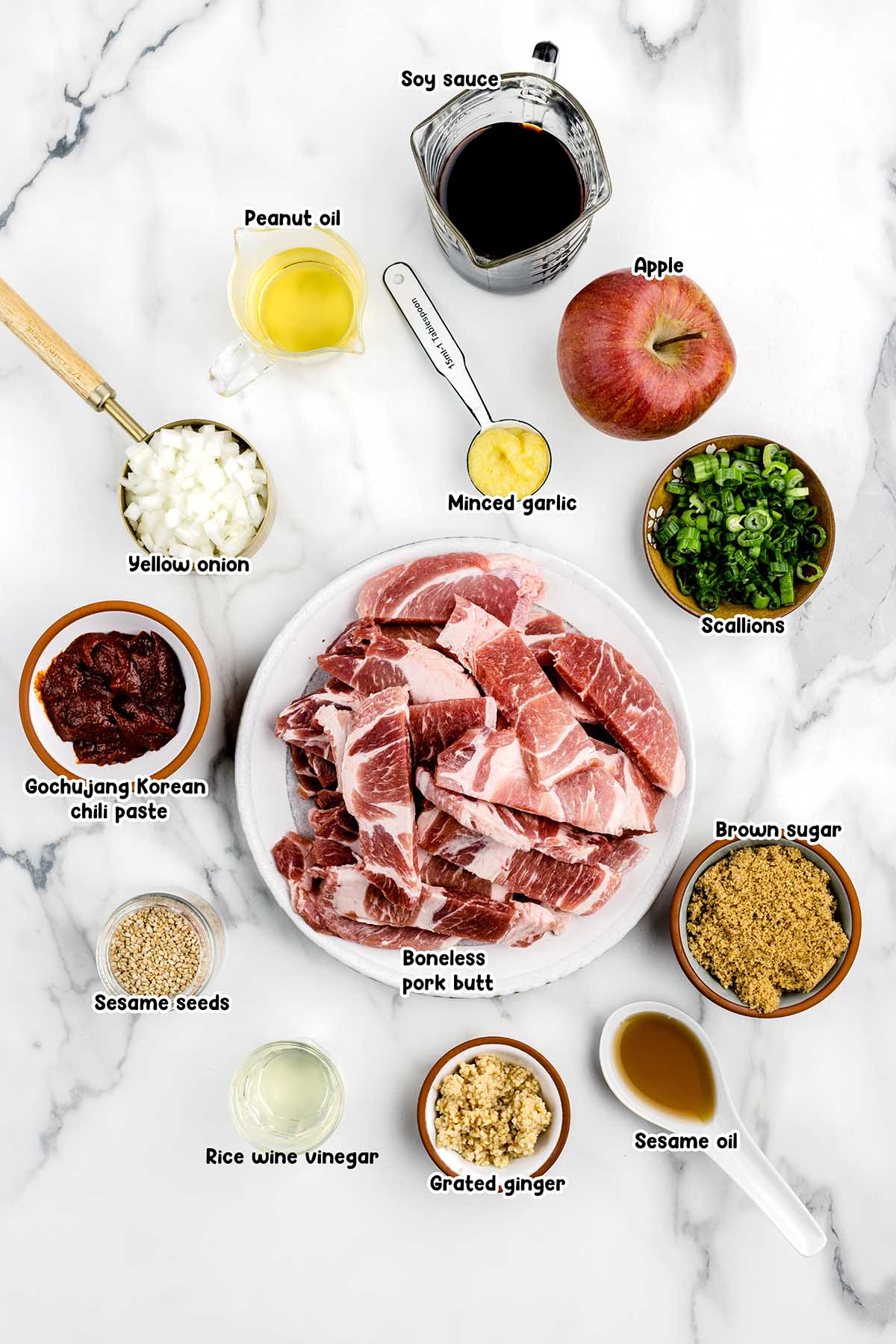
- Boneless pork butt
- Yellow onion
- Scallions
- Low-sodium soy sauce
- Apple: I used a small gala apple for this recipe.
- Seasoned rice wine vinegar
- Gochujang Korean chili paste
- Light brown sugar
- Minced garlic
- Grated ginger
- Sesame oil
- Peanut oil
- Sesame seeds (optional garnish)
Substitutions and Additions
- Handle More Heat: If you can handle a lot of heat in your recipes, add Gochujang paste or red pepper flakes to elevate your Korean BBQ pork’s heat/spice level.
- Pick Your Pork: You can substitute pork belly or sliced pork shoulder for pork butt. These cuts of meat are higher in fat, which works well with this intensely flavored marinade. Pork tenderloin and pork chops are very lean, but you can certainly use them if desired.
- Prepare Without Pork: Some people like substituting pork with thinly sliced ribeye steak meat for a beef version of this Korean pork recipe. Or, if you’d rather use poultry, try my Korean Chicken.
- Prepare Without Peanut Oil: Peanut oil is great for skillet cooking when you need to use very high heat, as it does not burn as quickly as olive oil. You can substitute with grapeseed oil or canola oil if you cannot use the peanut oil.

How to Make Korean BBQ Pork
- Make The Meat Mixture: Add the sliced pork butt, onion, and scallions to a bowl and set aside.
- Make The Marinade: Whisk together the soy sauce, apple, rice wine vinegar, Gochujang Korean chili paste, sugar, garlic, ginger, and sesame oil (Image 1).
- Coat, Cover, And Chill: Pour the marinade into the bowl of pork and onions (Image 2). Stir to fully coat, cover with plastic wrap, and refrigerate for 1 hour or up to overnight (Image 3).
- Cook: Cook the marinated pork in oil, in 2 separate batches, until cooked through and the marinade thickens into a glaze (Image 4).
- Serve: Garnish with green onion and sesame seeds (optional). Serve hot with a side of prepared white rice (I like to use jasmine rice with my Asian dishes). Enjoy!
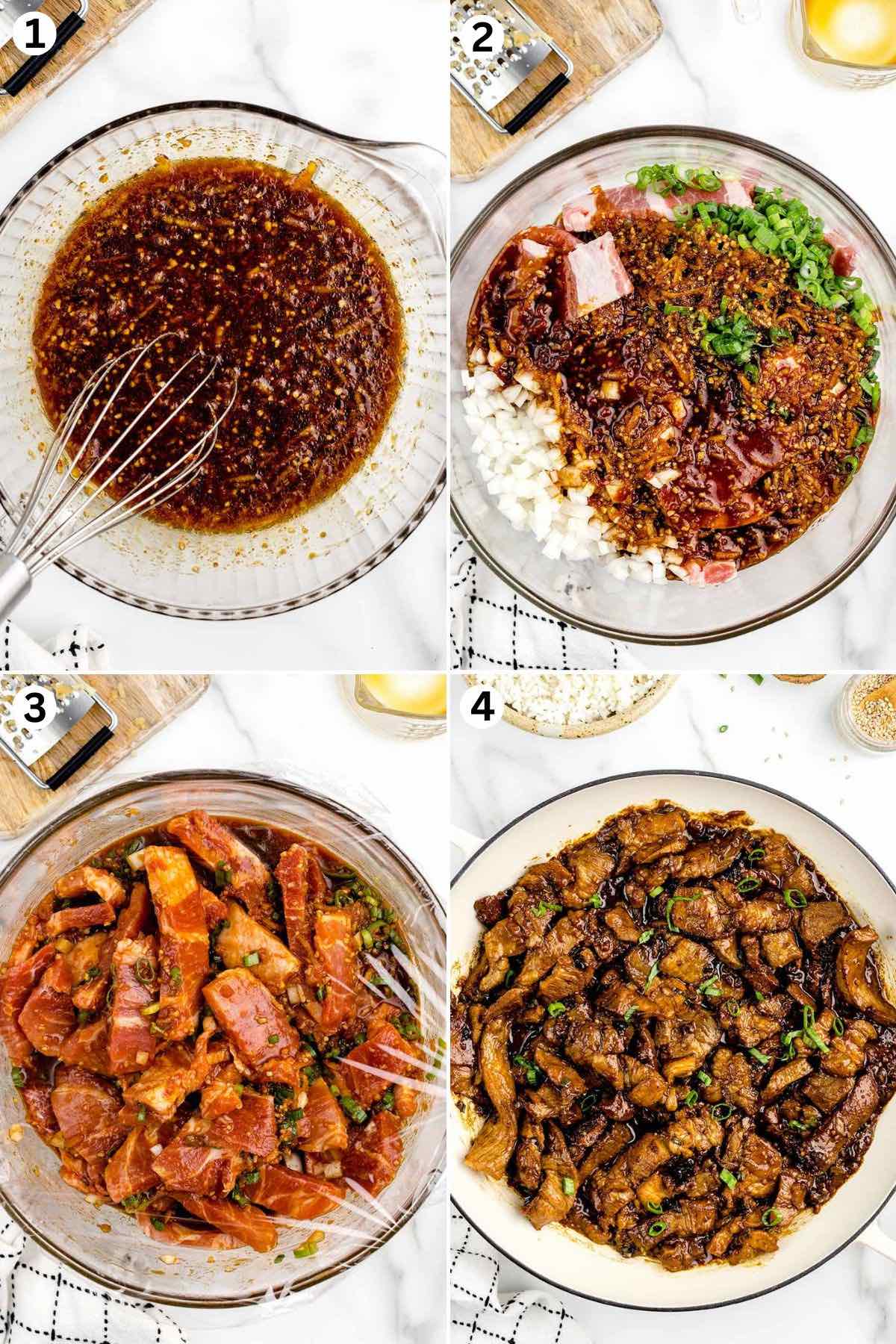
Tips For Making The Best Korean BBQ Pork
- If marinating the pork for more than 2 hours (or up to overnight), you will want to allow the bowl of marinated pork to sit on the counter for 20-30 minutes to allow the pork to come to room temperature. This will let the pork cook more evenly.
- I often can only find larger cuts of pork butt (4-5 pounds), so I like to slice all of it at once. I then place half of the sliced pork into a freezer-safe, zip-top bag. I squeeze out all the air and freeze for up to 2 months. This way, I can thaw the extra sliced pork later and make this quick and easy recipe.
- Freezing your pork butt for 2-3 hours will help firm up the meat to make slicing it into thin slices easier. Be sure to use a really sharp knife, as this cut of pork is fatty and makes it a bit harder to slice. You do not want to freeze your pork butt solid, as this will make it too hard to slice.
- I like to keep a jar of minced garlic and a tube of grated ginger (ginger paste) in my refrigerator to make quick and easy Asian marinades. The garlic and ginger do really well as shortcut ingredient items without the need to keep the fresh versions on hand.
- Be sure to use seasoned rice wine vinegar in this recipe. It is lightly sweetened, making it different from regular rice vinegar. You could substitute MIRIN or dry sherry (be sure to get a good quality that you would drink) in place of the seasoned rice vinegar.
How to Store Korean BBQ Pork
- To Store: In the refrigerator, you can store leftovers in an airtight container for up to 3 days.
- To Freeze: I do not suggest freezing this dish after cooking it; however, you can freeze the marinated sliced pork in a freezer-safe heavy-duty zip-top bag, with the excess air removed, for up to 1 month. Thaw completely in the refrigerator before cooking.
- To Reheat: Reheat on the stovetop or microwave until heated through.
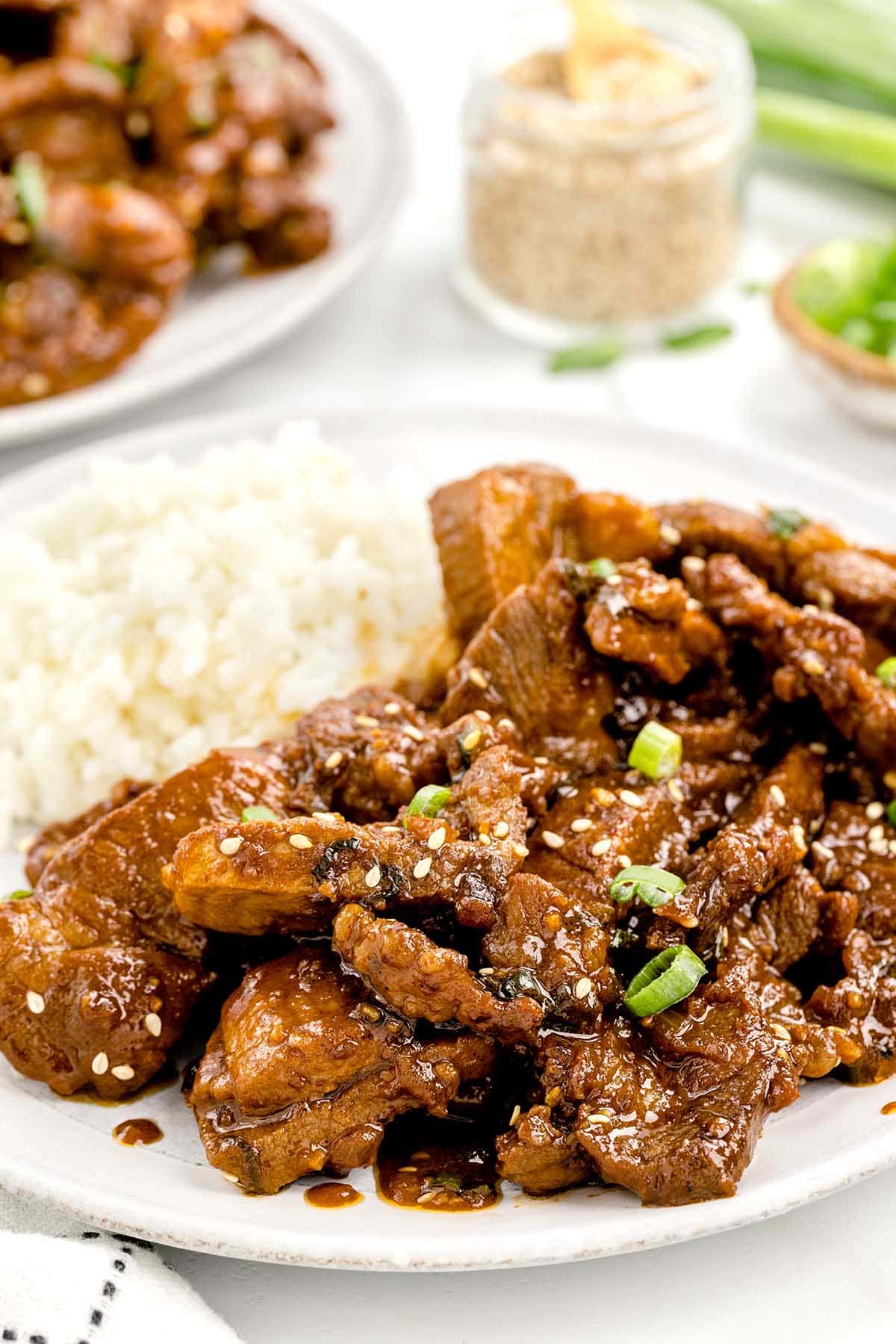
More Easy Dinner Recipes

Other Easy Asian Inspired Dishes
- Easy Fried Rice
- Sticky Sesame Cauliflower
- EggRoll In A Bowl
- Crab Rangoon
- Garlic Sesame Noodles
- Beef and Pepper Rice Bowl

Korean BBQ Pork
Ingredients
- 2 pounds thinly sliced boneless pork butt
- ½ cup chopped yellow onion
- ¾ cup chopped scallions divided into ½ cup and ¼ cup
- ½ cup low-sodium soy sauce
- ¼ cup grated apple 1 small gala apple peeled and shredded
- 3 tablespoons seasoned rice wine vinegar
- 3 tablespoons Gochujang Korean chili paste
- 3 tablespoons light brown sugar
- 1½ tablespoons minced garlic
- 1 tablespoon grated ginger
- 2 teaspoons sesame oil
- 2 tablespoons peanut oil plus an additional 1 tablespoon if needed for extra cooking batches
- ¼ teaspoon sesame seeds optional garnish
Instructions
- Add the thinly sliced pork butt, chopped yellow onion, and ½ cup chopped scallions in a large bowl. Set aside.2 pounds thinly sliced boneless pork butt, ½ cup chopped yellow onion, ¾ cup chopped scallions
- Make the marinade in a small mixing bowl by whisking together the soy sauce, grated apple, seasoned rice wine vinegar, Gochujang Korean chili paste, light brown sugar, minced garlic, grated ginger, and sesame oil.½ cup low-sodium soy sauce, ¼ cup grated apple, 3 tablespoons seasoned rice wine vinegar, 3 tablespoons Gochujang Korean chili paste, 3 tablespoons light brown sugar, 1½ tablespoons minced garlic, 1 tablespoon grated ginger, 2 teaspoons sesame oil
- Pour the marinade into the bowl of the pork and onions. Stir to fully coat all the pork with the marinade.
- Cover the bowl with plastic wrap and refrigerate for 1 hour or up to overnight to allow the pork to marinate and absorb the flavors.
- Add the peanut oil to a large, heavy-duty skillet on high heat. Once the oil is very hot, add half the marinated pork. Cook for 4-6 minutes. Remove the cooked pork to a serving plate and set aside.2 tablespoons peanut oil
- Add the remaining marinated pork to the skillet (add an additional 1 tablespoon of peanut oil if needed) and cook for another 4-6 minutes or until the pork is cooked through and the marinade thickens into a glaze.
- Add the second batch of cooked Korean BBQ pork to the serving plate and garnish with the remaining ¼ cup of chopped scallions and optional sesame seeds.¼ teaspoon sesame seeds, ¾ cup chopped scallions
Jenn’s Notes
- To Store: You can store leftovers, in an airtight container, for up to 3 days in the refrigerator.
- To Freeze: I do not suggest freezing this dish after cooking it; however, you can freeze the marinated sliced pork in a freezer-safe heavy-duty zip-top bag, with the excess air removed, for up to 1 month. Thaw completely in the refrigerator before cooking.
- To Reheat: Reheat on the stovetop or microwave until heated through.
- Please don’t skip the addition of the Gochujang Korean chili paste. This unique ingredient is very hard to substitute and get a similar flavor profile for your dish. I found this in the Asian aisle of my local grocery store. I did not need to go to a specialty store to find it. It can also be found online. You can store this ingredient in the refrigerator for quite some time (be sure to check the expiration dates on your container) and use it in many Asian recipes for a more complex sweet heat that a standard hot sauce or red pepper flakes will not give.
- If marinating the pork for more than 2 hours (or up to overnight), you will want to allow the bowl of marinated pork to sit on the counter for 20-30 minutes to allow the pork to come to room temperature. This will let the pork cook more evenly.
- I often can only find larger cuts of pork butt (4-5 pounds), so I like to slice all of it at once. I then place half of the sliced pork into a freezer-safe, zip-top bag. I squeeze out all the air and freeze for up to 2 months. This way, I can thaw the extra sliced pork at a later date and make this quick and easy recipe.
- Freezing your pork butt for 2-3 hours will help firm up the meat to make slicing it into thin slices easier. Be sure to use a really sharp knife, as this cut of pork is fatty and makes it a bit harder to slice. You do not want to freeze your pork butt solid, as this will make it too hard to slice.
- I like to keep a jar of minced garlic and a tube of grated ginger (ginger paste) in my refrigerator to make quick and easy Asian marinades. The garlic and ginger do really well as shortcut ingredient items without the need to keep the fresh versions on hand.
- Be sure to use seasoned rice wine vinegar in this recipe. It is lightly sweetened, making it different from regular rice vinegar. You could substitute MIRIN or dry sherry (be sure to get a good quality that you would drink) in place of the seasoned rice vinegar.


